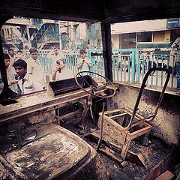 |
| (Images courtesy Uncultured/Creative Commons/Flickr) |
Bangladesh (MNN) ― At least 27 people died in clashes between police and Islamic hardliners in Bangladesh's capital city Monday.
Demonstrators were demanding that the government enact an anti-blasphemy law. We spoke with the national co-director ofAsian Access(A2)/Bangladesh, Rev. Peter Mazumder, who also serves as director of IFES-Bangladesh (International Fellowship of Evangelical Students). He explains, [sic] "Jamaat-e-Islami want to pressure that Bangladesh should have this blasphemy law, which is totally denied by the government of Bangladesh. And also, the concerned people from Bangladesh, they don't accept that one."
Essentially, that means the government of the Muslim-majority nation has rejected the demand, insisting that Bangladesh is governed by secular law.
However, Jamaat-e-Islami was joined by Hefajat-e-Islam, the islamist group behind the demand, and the main opposition party, the Bangladesh National Party (BNP). Hefajat-e-Islam attracted little public attention until recently. Mazumder says its mission is stated in its name: ‘Hefajat-e-Islam' translates to ‘protecting islam'.
With the three groups together, that advanced the number of protestors exponentially. It was a tinder box situation. Mazumder says, [Sic] "We don't like the violence. The fundamental groups are so dangerous, that they are breaking all the cars and everything, and all of the sudden, lots of riots is coming up, and it's not safe."
The opposition has sponsored a series of recent general strikes demanding that the next general election due in early 2014 be supervised by a neutral caretaker administration.
Paying attention to the political makeup of the government is particularly important because for a ministry like Asian Access, Bangladesh is the first Muslim country where they've set up operations.
In 2011, A2 launched its first leader development session in Bangladesh. Mazumder notes that Class 1 is in session this week, and only a few participants have been late or unable to come because of the protest strikes. It means that their work is largely undisrupted despite the upheaval. [Sic] "We are having our A2 seminars, and we are now completing the seventh seminar semester; in September, we're having our graduation."
Notably, the national strikes have impacted the last three previous sessions, (Sep, Nov, and Feb). A2 notes that sometimes the session needs to end early, in order to allow enough time for the pastors to make it back to their home churches in time to preach on Sunday.
The situation created a unique and unifying opportunity for Christians in Bangladesh, says Mazumder. [Sic]"The last few days many churches came together, and we prayed God may transform this situation and change the situation. We'd like to see a peaceful country like that, so you can pray for that."
The accord between these Christians is proof that A2's approach to church leadership training and discipleship training works. Essentially, it boils down to this idea: If you want to plant a church, you must first grow a leader. Careful selection of a select group of emerging leaders is key. The Asian Access leadership training has been recognized as one of the most creative and fruitful leadership training programs in Asia.
Continue to pray for the safety of the students and leaders. Ask God to intervene on behalf of believers in Bangladesh. Pray for peace to be restored. If you want to see more about the leadership training model, click here.
No comments:
Post a Comment